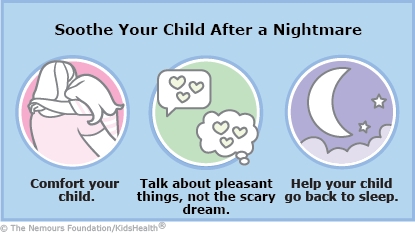A nightmare is a scary or upsetting dream that usually wakes a person up. It's normal for kids to have nightmares occasionally. You can't completely prevent nightmares, but you can help make them less likely. And if your child does have one, you can comfort them and help them get back to sleep.



Your child:

What happens during a nightmare? There are several different stages of sleep. One is the REM (rapid eye movement) stage. Most people have several REM stages each night. Nightmares usually happen during the later part of a night's sleep, which is when REM stages are longer.
At what age are nightmares most common? Nightmares tend to happen most often in the preschool years, but people of all ages can get them. Usually, kids have fewer nightmares by the time they're teens.